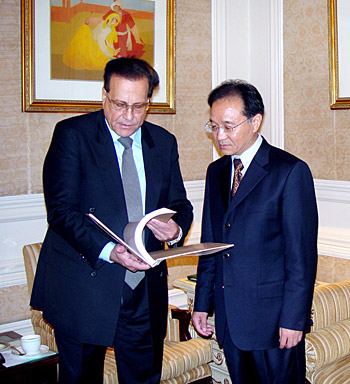An all-out operation announced by the Pakistani army in mid-April against the Taliban and other extremist groups has put the country in the spotlight of the global war on terrorism.
Neighboring the battle-scarred North-West Frontier Province (NWFP) to the west, Punjab Province, the country's most populous province, plays a vital role in both political and economic spheres. Salmaan Taseer, the governor of Punjab Province, sat down with visiting Beijing Review President and Editor in Chief Gangyi Wang and talked about anti-terrorism, domestic situation in Pakistan and Sino-Pakistani relations.
 |
|
Salmaan Taseer (left), governor of Punjab Province, meets with visiting Beijing Review President and Editor in Chief Gangyi Wang on August 8 in Lahore, Pakistan [Pan Shuangqin/Beijing Review] |
Beijing Review: How do you comment on the military operations by the Pakistani army in the Swat Valley against the Taliban and other extremist groups?
Salmaan Taseer: We have had major success in the last few months. The government's action sends a very strong message that we are there to stay, and we won't let the people be terrified by the Taliban again.
The government has compensated the people in Swat, giving them their homes and lives back. The most important thing is that they feel secure, again. I think it's a very big achievement.
Swat in the NWFP is a peace-loving area. We are going to restore the culture, tradition and social structure which Taliban had damaged to a severe extent.
What is very good for all the Pakistani people out of this is that the whole country has stuck together in the crisis. All the political parties and people from all walks of life are now supporting the military action, rehabilitation and reconstruction in Swat. This solidarity makes a big difference. When the people in Swat receive food and daily necessities from other parts of the country, they feel a sense of belonging and the country is one.
How do you view political development in Pakistan?
Despite the anti-terrorist war in the north, we have a working democracy in Pakistan for all.
People have the wrong perception of Pakistan. They used to say that a Muslim country does not have democracy. They don't understand the cultural values that Pakistan has inherited throughout history. We are not like any other country in the world. The fact is that we have produced a very successful democracy – Pakistan has proved that a country of different languages and cultures is one country with completely free democracy. It represents significant progress and is a very important thing for the rest of the world.
In which areas do you think China and Pakistan should enhance cooperation?
Agricultural cooperation with China is really important for us. During his second visit to China earlier this year, Pakistani President Asif Ali Zardari did a lot of research on agriculture, and the two governments signed related cooperation memorandums.
Unlike other sectors, agriculture is not an industry that can see an outcome in the short term. We need high technology for farmers and rural areas. With the help of China's technology, Pakistan's rice output will increase significantly, and the cooperation program will be conducive to the improvement of Pakistani farmers' livelihood and poverty reduction.
Power generation and infrastructure construction are important for us, too. But unfortunately, we are suffering from shortages in those areas. We appreciate that the Chinese government has always supported our development. China has invested in infrastructure facilities like telecommunications, electricity and in technological equipment in Pakistan, which has been very successful. It's a golden time for both of us now as we make bigger achievements.
Pakistan was one of the first countries to recognize the founding of the People's Republic of China. On international front, the two countries have never had a conflict. The friendship between Pakistan and China has been going on for many decades, which is very rare all over the world.
You are the Chancellor of the University of Gujrat. How do you view the role education plays in the country's development?
We have a very highly-educated population, with doctors, technicians and bankers all over the world. Women in Pakistan are not backward. There is a very good sign – more than 50 percent of the students in the University of the Punjab are female and, in some universities, they account for nearly 60 percent. The figure is growing every year.
We are making efforts to expand the education system and there is no limit – from secondary schools to higher education, from social sciences to technological research. The investment in human resources is really important.
I am pleased to see that technical expertise and exchange scholarships from Chinese universities are open to Pakistani students. I met some of them six months ago in China. They said they had wonderful experiences and were so happy to be there. They felt the Chinese people were as warm as the Pakistani people.
(Beijing Review, August 13, 2009)